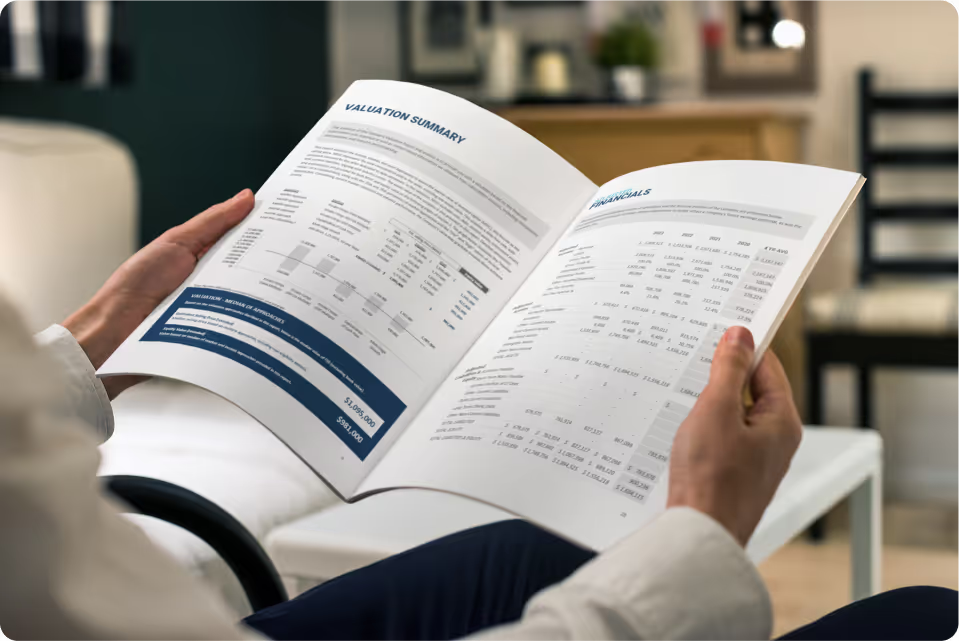Valuation Costs: What Small Business Owners Should Expect in 2026

For many small businesses, understanding valuation costs is one of the first steps toward selling, refinancing, or succession planning. Yet the range in pricing can be confusing, and many owners wonder why some valuations cost a few hundred dollars while others cost much more.
The truth is that valuation pricing depends on the purpose, complexity, and depth of analysis required. At BizWorth, every valuations is conducted by a certified appraisers, regardless of the report chosen. This ensures accuracy and credibility, whether you need a quick estimate or a court-defensible certified report.
In this article, we’ll break down valuation costs, explain what drives price differences, and share what small business owners should expect in 2026 when asking “How much does a business valuation cost?”
1. What Are Typical Valuation Costs in 2026?
For small businesses, generally those with less than $10million in annual revenue and a straightforward ownership structure, professional business valuations in the U.S. typically range from $2,000 to $10,000.
The cost depends on the scope of work, purpose, and certification level required. Most small business owners begin with a Standard Valuation, which falls on the lower end of this range, while Certified Valuations require more detailed analysis, documentation, and compliance with professional appraisal standards.
Here’s a breakdown of BizWorth’s valuation reports types and price ranges:
- Standard Valuation: $1,500-$4,000, ideal for owners who want an accurate, data-driven estimate without legal documentation.
- Certified Valuation: $7,000-$8,000 –required for IRS filings, divorces, partnership buyouts, or litigation where the report must meet certified appraisal standards.
- Comprehensive Valuation Engagement:$10,000+ - for multi-entity holdings, complex capital structures, or multiple operating locations.
Certified appraisers consider not only financial data but also risk, market conditions, and asset structure. Each element requires in-depth analysis and documentation, which drives the difference in valuation costs.
[INLINE_CTA]
2. The Difference Between Certified and Standard Valuations
BizWorth offers two levels of valuation engagements, designed to meet different needs while maintaining the highest professional standards.
- Certified Valuations: These meet the requirements of the IRS, SBA, and courts. They include full documentation, defensible assumptions, and a signed conclusion of value.
- Standard Valuations: These follow the same analytical principles but exclude legal documentation and peer review. They are ideal for business planning, exit preparation, selling, buying, or benchmarking your company’s worth without paying full certified valuation costs.
While both involve certified appraisers, Standard Valuations are more streamlined, allowing business owners to receive accurate, affordable, and actionable results without the wait or cost of a Certified Valuation.
3. What Small Business Owners Should Expect in 2026
Heading into 2026, several factors are shaping how much a business valuation costs. Inflation, AI-assisted data tools, and updates to SBA and IRS compliance requirements are influencing both price and process.
Here’s what business owners can expect:
- More Accurate Benchmarks: Access to nationwide transaction databases continues to improve precision.
- Stronger Compliance Focus: Lenders and tax authorities increasingly expect valuations to align with recognized appraisal professional standards.
- Faster Turnaround Times: Turnaround varies by report type. A Standard Valuation Report can often be completed in less than 10 business days when financial information is provided promptly. Certified Valuations, which require additional review, documentation, and compliance, typically take up to 20 business days at BizWorth. Other providers may take longer, depending on complexity and scheduling.
Overall, 2026 will continue to highlight the difference between certified valuations, which focus on compliance and legal defensibility, and standard valuations, which focus on planning and decision-making. Both offer significant value depending on your goals and stage of business.
4. How to Prepare Before Requesting a Valuation
Proper preparation helps reduce valuation costs and ensures a smoother process. Before engaging a valuation firm, business owners should:
- Gather at least three years of financial statements including income and balance sheets.
- Organize your tax returns.
- Clarify the purpose of the valuation, whether itis for a sale, loan, or tax planning, or internal strategy.
- Be transparent about challenges and growth opportunities.
This preparation minimizes data cleanup and shortens turnaround time.
Common Misconceptions About Valuation Costs
Many owners assume valuation pricing is one-size-fits-all. In reality, costs depend on depth, data quality, and report requirements.
- Myth 1: “Valuations are based only on revenue.”
- Certified appraisers consider multiple factors including profitability, risk, and market conditions, all reflected in your company’s financial performance.
- Myth 2: “Online calculators give the same result.”
- Automated tools provide rough estimates, not certified conclusions that hold up to lender, investor, or IRS scrutiny.
- Myth 3: “A higher cost means a higher valuation.”
- The price reflects the level of analysis and documentation, not your company’s worth. Accurate value depends on methodology, not marketing.
Certified appraisers deliver consistent, defensible results that withstand review by buyers, lenders, and tax authorities.
Valuation Costs Are an Investment in Clarity
In 2026, business owners should view valuation costs not as an expense but as an investment in clarity and credibility. Whether you’re selling, securing funding, or planning succession, a professional valuation from a certified appraiser provides a defensible estimate that protects your interests and strengthens your position.
While valuations for larger or more complex companies can exceed $10,000, most small businesses, those with under $10 million in annual revenue, can expect a professional, certified valuation to fall within the$2,000 to $10,000 range.
If you’re wondering how much does a business valuation cost or which option fits your situation, BizWorth’s team of certified appraisers can guide you through the process.
Your business is worth knowing, and understanding that value begins with a transparent, accurate, and trusted valuation.


